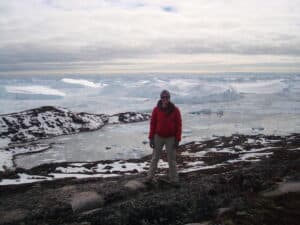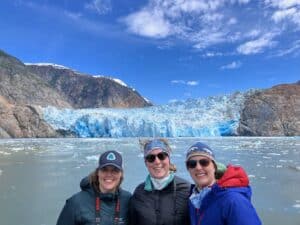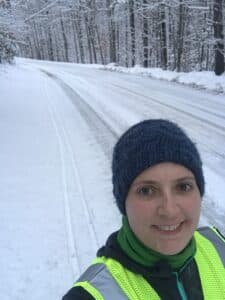Jessica Scheick
Dr. Jessica Scheick’s work focuses on glaciology, remote sensing, and collaborative development. Her glaciology work explores ice-ocean interactions, specifically focusing on icebergs and what they can tell us about glacier flow and how that flow is changing as a result of climate change. Broadly, her research emphasizes building community, writing software, and educating her fellow scientists in open science best practices.
Jessica earned her A.B. from Bryn Mawr College, where she majored in geology and mathematics, fell in love with fieldwork, and gained confidence as a woman in STEM. A couple of years in environmental consulting gave her field leadership skills and experience and solidified her love of glaciers as a field of study. She went on to earn her PhD at the University of Maine, where she was fortunate to conduct field research on glaciers and ice sheets around the world. During a six week internship in Greenland, locals shared their lifelong observations about their icy environments. This ultimately led to one of her dissertation

Icebergs (calved from Sermeq Kujalleq, briefly known as Jakobshavn Isbrae) in Ilulissat Icefjord at the mouth of Disko Bay near Ilulissat, Greenland.
chapters building automated methods to detect icebergs in remote sensing datasets. She continues to focus on utilizing the vast archive of large, scientific datasets to investigate icebergs and conduct fair, accessible, interoperable, and reproducible (FAIR) science.
 owned businesses, and developing templates and training to establish mandatory Field Safety Plans for all University affiliated fieldwork. The safety plans include anti-bias training and aim to make fieldwork a safe space for all participants. With UW, Jessica helps organize and run hackweek events to provide training and help researchers build applied skills in open science and data-intensive contexts.
owned businesses, and developing templates and training to establish mandatory Field Safety Plans for all University affiliated fieldwork. The safety plans include anti-bias training and aim to make fieldwork a safe space for all participants. With UW, Jessica helps organize and run hackweek events to provide training and help researchers build applied skills in open science and data-intensive contexts.
